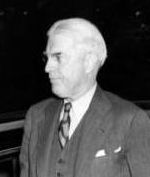Interim Committee
The Interim Committee was a secret high-level group created in May 1945 by United States Secretary of War, Henry L. Stimson at the urging of leaders of the Manhattan Project and with the approval of President Harry S. Truman to advise on matters pertaining to nuclear energy.
Composed of prominent political, scientific and industrial figures, the Interim Committee had broad terms of reference which included advising the President on wartime controls and the release of information, and making recommendations on post-war controls and policies related to nuclear energy, including legislation.
It was named "Interim" in anticipation of a permanent body that would later replace it after the war, where the development of nuclear technology would be placed firmly under civilian control.
[3] In arriving at its conclusion, the committee was advised by a Scientific Panel of four physicists from the Manhattan Project: Enrico Fermi and Arthur H. Compton of the Metallurgical Laboratory at the University of Chicago; Ernest O. Lawrence of the Radiation Laboratory at the University of California at Berkeley; and J. Robert Oppenheimer, who directed the bomb assembly program at Los Alamos.
Others emphasize the opportunity of saving American lives by immediate military use, and believe that such use will improve the international prospects, in that they are more concerned with the prevention of war than with the elimination of this specific weapon.
[5] Reviewing the Scientific Panel's report on June 21, the committee reaffirmed its position:[6] ...that the weapon be used against Japan at the earliest opportunity, that it be used without warning, and that it be used on a dual target, namely, a military installation or war plant surrounded by or adjacent to homes or other buildings most susceptible to damage.The Interim Committee was given responsibility for the preparation of separate prepared statements for the President and the Secretary of War to be released when nuclear weapons were used.
The force from which the sun draws its power has been loosed against those who brought war to the Far East.In July 1944, before the Interim Committee was formed, Bush, Conant, and Irvin Stewart had produced a proposal for legislation to control nuclear energy.
It granted the commission broad powers to acquire property, to operate facilities, to conduct research and to regulate all forms of nuclear energy.
[12] The Royall-Marbury bill was introduced into the United States Congress by the chairman of the House Military Affairs Committee, Andrew J.







